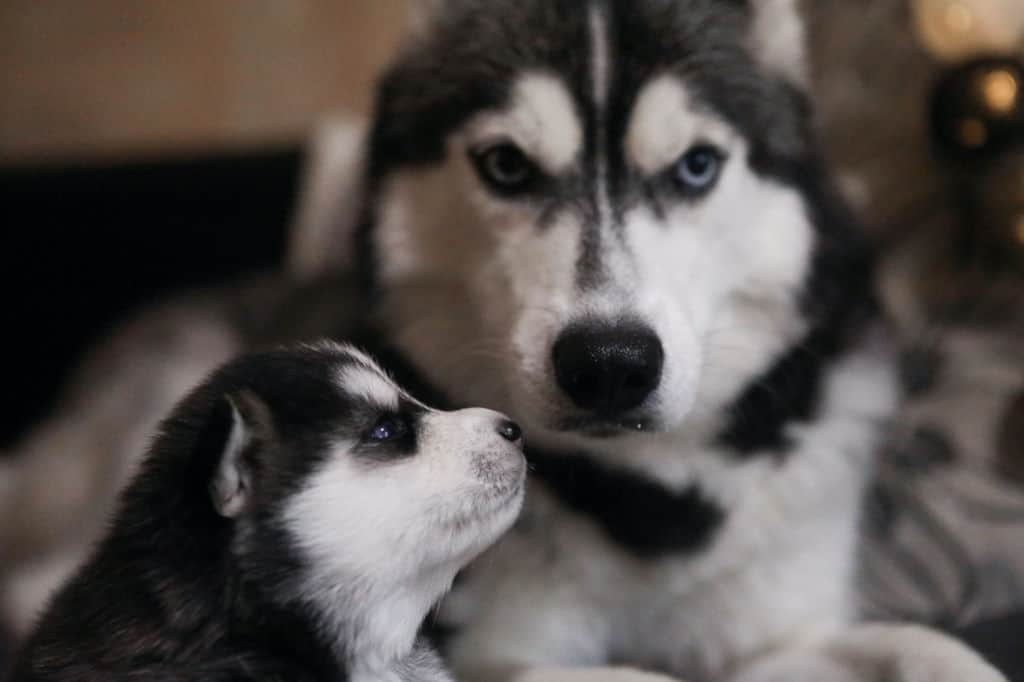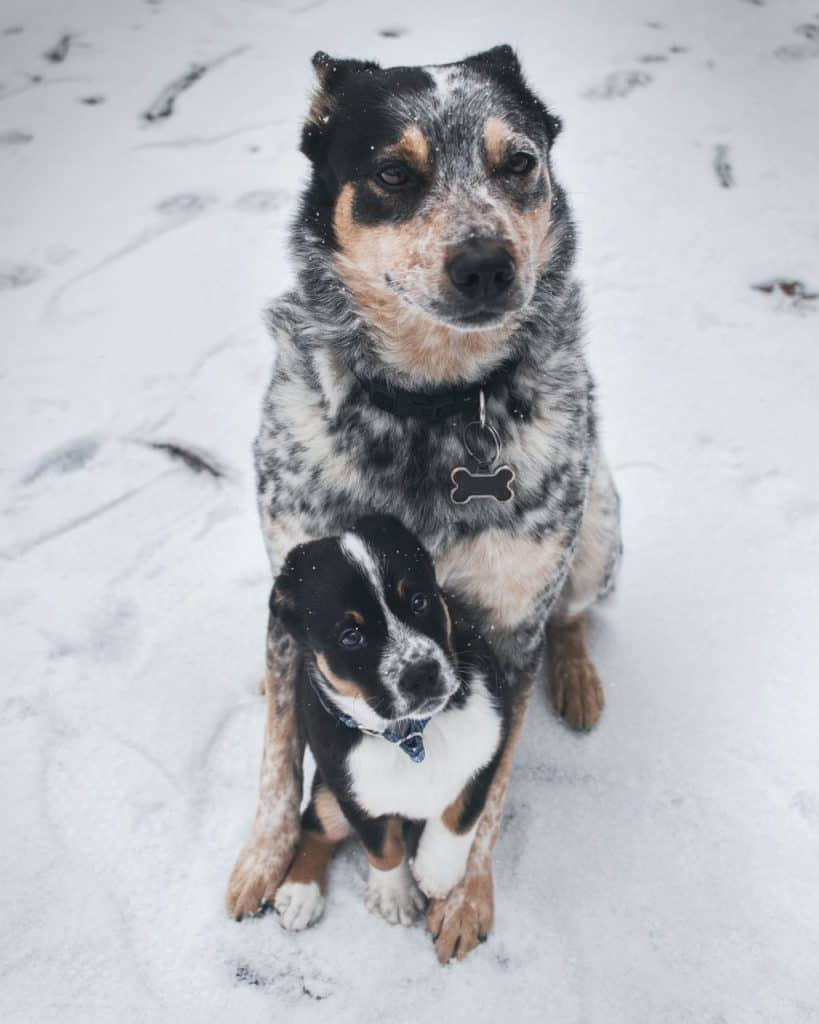If you’ve never had male puppies, and the dad dog is around, it’s essential to know how to proceed before the puppies arrive.
It’s usually advised to separate the male from the mother and litter during the last few weeks of pregnancy until the puppies are at least four to six weeks old. The older dog is unlikely to recognize the puppies as their own, and he may badly injure them.
Once the puppies are old enough, you can carefully introduce the adult father dog. They will be able to develop a pack hierarchy and coexist peacefully.
Interestingly, as father and son dogs grow older together, their dynamic can transform, often leaning towards mutual respect and understanding. This isn’t an instantaneous process and consistent guidance from the owner is crucial.

Can a Male Dog Live With His Son?
Often, it is up to the mother dog to decide if you should let your father’s dog be with its puppy. Many new mothers will not allow any other dog near their puppies, so it’s vital to notice this behavior.
One of the main problems is that the father dog may think the puppies are potential rivals for the pack’s eligible females. However, there have been instances where father and son dogs bond remarkably well, fostering a sense of camaraderie and even displaying protective behavior towards one another.
To be on the safe side, either keep them separated or under constant supervision until the puppies are old enough to defend themselves. Afterward, he can maintain dominance without harming the smaller dogs.
Many male dogs are quite loving with their own and other dogs’ puppies, but you should let him approach on a leash and observe how things go. You can let him watch the pups with supervision, but I wouldn’t let him touch them because they are vulnerable and can easily catch things.
Is the father aware that it is his puppy? He recognizes them as members of the same pack or family. Since dogs do not consider relationships the same way humans do, they understand they are in the same pack and that the father is usually the alpha, but they don’t understand the concept of siblings.
Be warned that intact male dogs are significantly more likely to exhibit hostility toward each other than neutered male dogs.
Whether or not you keep the puppy, please consider the benefits of spaying/neutering your dog. With proper timing, most risks can be avoided, the lifespan of your dog prolonged, and their health improved.
Should You Keep a Puppy and Father Dog Together?
The main reason male dogs are typically not near newborn puppies is that male dogs are easily stimulated. They may want to play with the puppies who can still move.
The father has no idea they are his puppies because they will not smell like him, and there is no scent order to notify him. As a result, some males may rush in to entice the puppies to play and injure them.
Or, since they are so young, the male may perceive them as invaders in his territory and attempt to attack. When they are mature enough, though, the father dog is a terrific tutor to the puppy and is more enjoyable for the parents.
Over time, with proper socialization and guidance, many father-son dog pairs have been observed to develop a deep bond, relying on each other for play, exploration, and even comfort during stressful situations.
What to Do if Father and Son Dogs Are Fighting?
In general, if two dogs are fighting, separating them is the last thing you want to do. You must quiet them down while they are in the same room. This reinforces the social norm of a calm demeanor.
Because you haven’t offered them another coping technique, breaking them up and separating them promotes and enforces the concept that fighting is acceptable.
Inappropriate play habits are frequently the result of incorrect socialization, and resource guarding is a prevalent issue in multidog households that you should address.
In the case of the father dog and his male offspring, there’s usually just enough confrontation to demonstrate that the dad was the alpha dog by growling and teeth-baring, but without them actually fighting. There should be no genuine competition for females.
It’s fascinating to note that in some households, father and son dogs, after an initial phase of establishing dominance, often become inseparable companions. This goes to show that with proper care, the age-old adage of ‘like father, like son’ can truly come to life in the canine world.

However, it’s critical to distinguish between fighting and rough play. My dogs play by growling, chasing, jumping, knocking over furniture, rolling on the ground, and getting dirty. Sometimes they look scary, but they may just be playing.
Establishing clear play boundaries and familiarizing both the father and son dogs with commands can be beneficial. This not only ensures safety but also nurtures a healthy relationship between the two, mitigating the chances of misunderstandings escalating into conflicts.
Could a Father Dog Kill a Puppy?
Non-neutered male dogs, like many pack animals, may kill male puppies. A father dog may be intrigued by the new arrivals and may even want to sniff and play with them. However, an adult dog’s sense of play might be dangerous to vulnerable newborn puppies.
Some male dogs could be envious of the litter, but there could be other reasons. Father dogs may attack their offspring for various reasons, including jealousy, the acceptance of another mating, and anxiety or over-stimulation from the puppies.
The father dog is less inclined to eat or attack his pups. However, they may occasionally kill the puppies in an innate attempt to reestablish the mother’s estrus or as a violent reaction to the puppies being too boisterous and overstimulating.
FAQs
Can a mother dog live with their male offspring?
The male offspring shouldn’t generally live with their mothers for longer than a few months. There are two possible negative outcomes. They may first attempt to mate. Second, this pup is likely to develop undesirable codependency on the mother, whether unrelated or not.
How to tell if a fight between dogs is serious?
Instead of nice nips, look for symptoms of hostility, such as ears cocked back, flashing fangs, wincing, tail between legs or straight out, growling, and so on. If any of the dogs become overly violent, promptly correct them with a firm “no” and remove the dog from play for a second or two.
Do male dogs recognize their siblings?
Dogs generally know one another through clues such as smell, sight, or the fact that they dwell nearby. It is unknown and maybe unknowable if they genuinely understand that an individual is a relative. The male who fathered the litter is unlikely to identify them.
Alex, a passionate animal lover, has experience in training and understanding animal behavior. As a proud pet parent to two dogs and three cats, he founded AnimalReport.net to share insights from animal experts and expand his knowledge of the animal kingdom.




